How Long Should It Take to Write a Blog Post on Average?
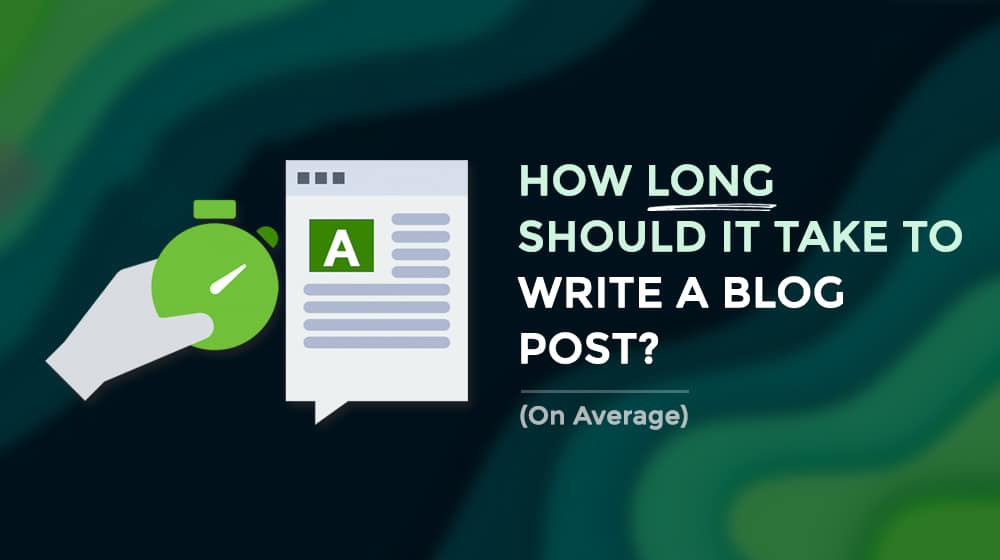
The average length of a good blog post seems to be increasing every year.
Back in 2011, when Google released Panda and changed content marketing forever, blog posts ranged from 300 words to maybe 1,000 from a particularly ambitious marketer.
Panda made those 1,000-word posts the baseline, and now a mediocre-to-good post is around 1,500. I, personally, aim for around 2,000 for everything I write, though I often end up at 2,300 or more.
So how long should it take to write one of these blog posts? Numbers and estimates vary quite a bit, so let's take a look at some data.
Industry Data
Orbit Media has performed an industry survey every year since 2014, asking some common questions about blogging. They send this survey out to bloggers, aggregate the data, and present their findings each year. The most recently published iteration of the survey is the 2022 version, and you can find it here.
They ask some interesting questions. How often do bloggers publish? How many draft headlines do they write? How do they promote their content? It's a fascinating look into other bloggers who have developed their own strategies over the years. Comparing it to your own workflow might be an eye-opening experience.
Among other questions, one they ask every year is "how long does it take to write a blog post?" So what's their data?
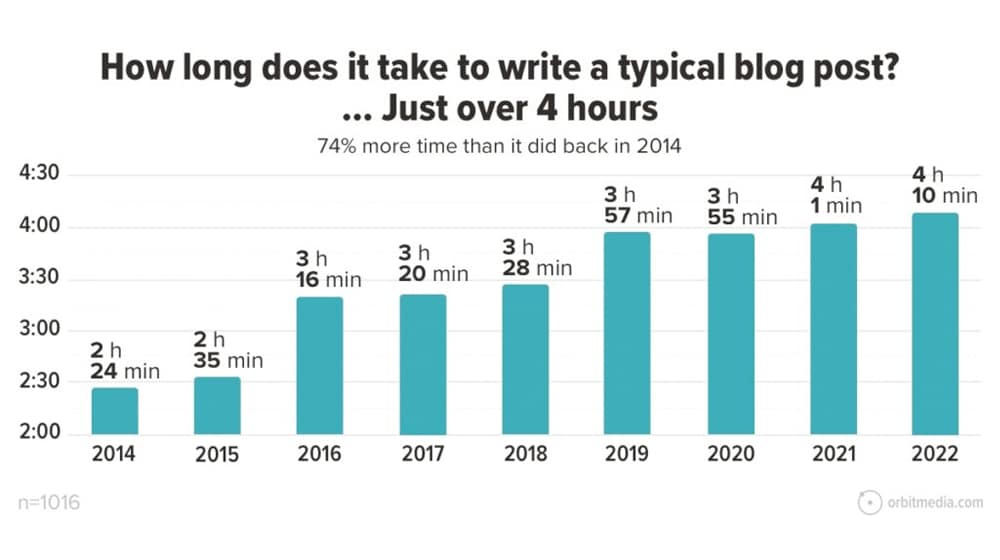
That's the data according to the Orbit survey. The number has gone up every year, as well; initially, it was two hours and 24 minutes on average, in 2014. It crossed the three-hour mark in 2016 and is slated to cross the four-hour mark in 2020.
Here's the interesting thing: the amount of time it takes needs context. That context includes, among other things, the length of the average blog post.
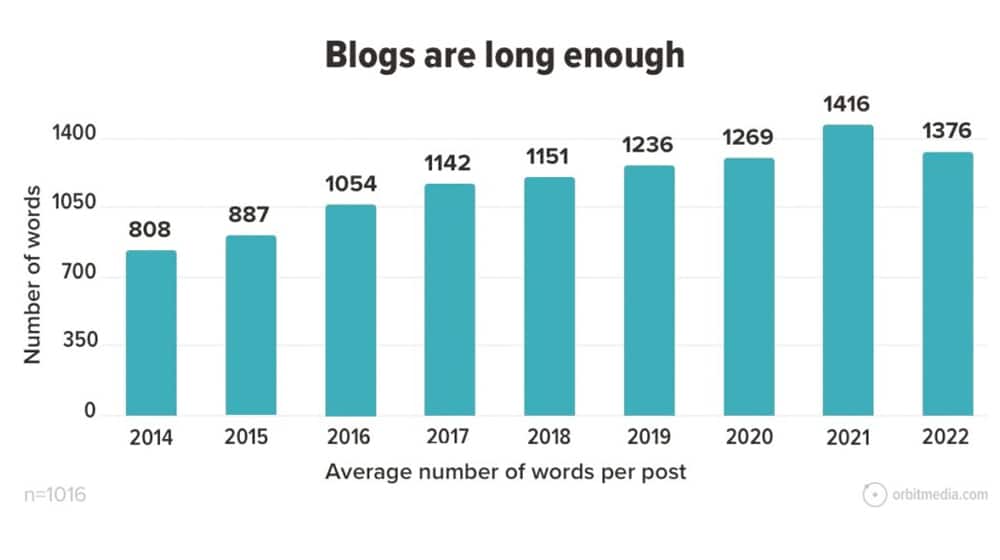
If that sounds shockingly short, well, those numbers alone don't necessarily tell the whole story.
Over the last five years, the average length of blog posts has been increasing. In 2014, nearly 20% of those responding to the survey said their blog posts were under 500 words long. Today, that number is only 6%. Meanwhile, in 2014, virtually no one said they wrote posts over 2,000 words long, but today 11% of blog posts – written by the people responding to the survey, anyways – are over 2,000 words long.
Compare this to the time invested in writing those posts. In 2014, around 16% of bloggers took under an hour to write their posts, and under 4% of them took over six hours to write. Today, only 4.6% of bloggers take under an hour, while nearly 20% of bloggers take over six hours.
As posts get longer, the time investment to create them gets longer as well.
There are some other factors that can put this data into perspective as well. For example, the frequency of publication. When you're writing 500-word blog posts, it's easy to publish 2-3 of them per day if you really want to. Spending six hours to write 2,000 words, though, means that you're likely only going to be publishing 1-3 blog posts per week. I know of several big-time bloggers that go even further in that direction, writing 3,000+ word posts and publishing only once every 2-3 weeks, if that.
Now, sure, if you're a relative unknown, it's going to be more difficult to pull off that kind of content production schedule. A site needs to hit a certain threshold of popularity and content archives before it can survive on that little content. That's why I often talk about working to build a site like rolling up a snowball.
Factors Influencing Time to Write a Post
So what goes into writing a blog post that makes it take more time? Or, to put the question a little differently, what can you do to balance blog writing so it isn't a terrible slog?
1. Length. Obviously, one of the largest factors in how long it takes to write a blog post is how long that post is. Some topics you can write about for a lot longer a lot more easily than others, sure, but on average, across all blog posts, the longer the post is, the more time it will take to write. Even if you do all of your preparation beforehand and only count the actual time spent writing, the act of typing a post takes longer the more words you have to type.
2. Depth. The depth of a blog post is a huge factor in how long it takes to write a post. This post you're reading right now, I could have written in half the time it's taken me if I was only being superficial, talking about my own experiences, and giving you platitudes about how writing is an art form and how it varies for everyone. Since I'm looking at actual data and giving you an analysis of various factors that influence the topic, it takes longer to write.
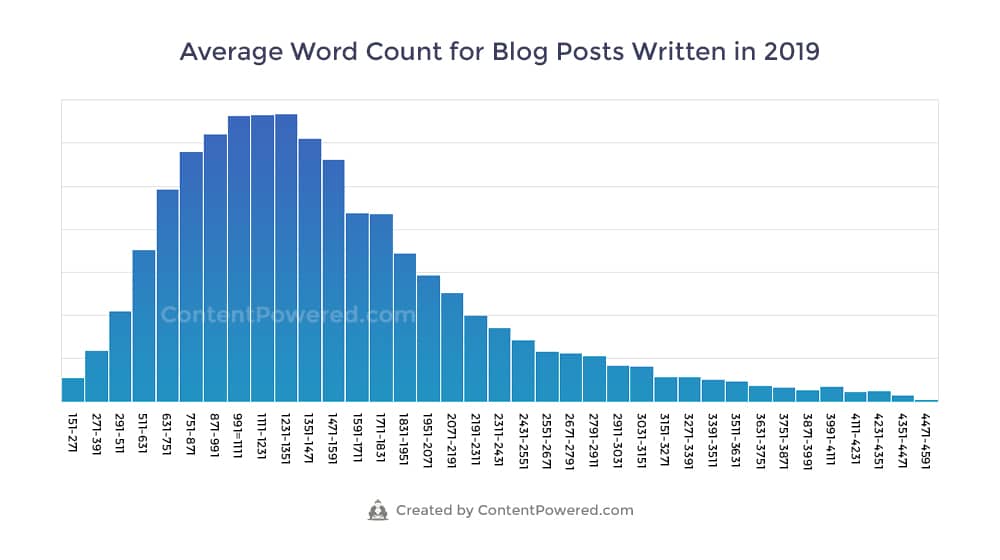
3. Complexity. The complexity of a topic can dramatically influence how long it takes to write about that topic. Writing a blog post about the average length of blog posts wouldn't take as long as writing this blog post, because this one has more factors and more data to consider. I have to analyze different sets of information and present that information in a consistent, easy to digest way.
4. Familiarity. The more familiar you are with a topic, the easier it will be to write about that topic. I see this often when I'm working on blog posts for clients. I have clients who are in a marketing niche, and since I've written a lot and learned a lot about marketing over the last half a decade or so, it's pretty easy to write a lot of the basis and framework for those posts. Conversely, new clients in niches I don't traditionally write about, like law or medical topics, can take longer. I simply don't have the years worth of accumulated knowledge to draw on for these topics and have to perform significant research first.
5. Original research. Speaking of research, the more research you have to do, the longer it will take to write a post. One thing I wonder about the results of the Orbit survey is how many of those bloggers count things like performing a survey as part of their writing process. I could write up a blog post like the Orbit post in a few hours if I had the data in front of me, but getting that data takes days itself. Do they count that as part of it? I've done a few posts like that myself, doing a lot of data scraping and analysis or sending out interview questions to dozens of marketers and aggregating the results, and those posts take exponentially longer to produce than my average posts.
6. Media creation. This is another factor that doesn't really come up in the Orbit study; the media and other "accessories" for a post.
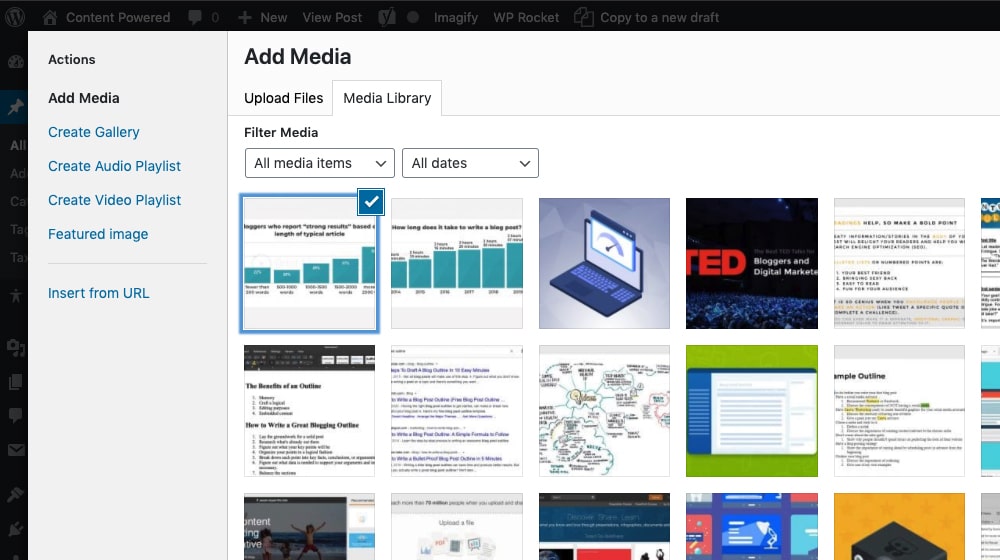
When they talk about writing a post, do they mean the actual act of writing the post, or do they include things like:
- The keyword research that goes into determining the post subject.
- The iteration and testing of headlines for a post.
- The creation and optimization of meta information like titles, alt text, and descriptions for the post.
- The creation of images or videos that you produce to go along with the post.
- The hunt for social media posts you can embed into your post.
Any of this kind of additional work will add to the overall time it takes to create a post. While the actual act of writing a blog post only takes me 1-2 hours for a 2,000-word post, when you add in the keyword research (which can be anywhere from 30 minutes to 2 hours), the formatting, metadata, and embedding (which can be another hour) and the media creation (which takes another hour or so when I do it myself, though I often hire someone to handle it), it expands quite a bit, and I can see the 4-6 hour estimate being quite reasonable.
7. Experience. Experience is one of the biggest factors at play here. When I was just starting out, I might spend two hours writing a 500-word blog post, optimizing every sentence, and getting every piece of data just right. I might have to do things like double-check style guides, verify common facts, and spend time figuring out a blog post structure.

By the time you've spent two, three, five, ten years writing blog posts, a lot of that is internalized. You know the good websites to use as sources, you know the basic facts, you know the formatting, you know what works. Not to mention you internalize the act of writing, so you produce content at a faster rate. The better you are at something, the faster you can produce results and the better those results can be.
8. Environment. To a certain degree, the environment in which you write will have an impact on how quickly you can produce a blog post. I've written some while traveling, and it's harder to focus in an unfamiliar environment. Working from home can be difficult if you have the distraction of kids, pets, household tasks, and so on. If you don't have an office, it's easier for non-office distractions to reach you.
9. Mindset. Sometimes you're in a good frame of mind to write, and sometimes not. I've had times when I can bang out a complex, deep post about a new topic in two hours, and I've had times where it takes me eight hours of stop-and-start work throughout the day to write a post that should be simple and easy to produce. Building the writing habit, working in an office, loading up on caffeine; it can all only do so much.
Balancing the Scales
If a blog post takes 4-6 hours to write, is that a good thing or a bad thing? If you're taking less time to write a post, should you feel bad? If you're taking more time to write one, are you doing something wrong?
Blog writing is, at its core, a very personalized task. Every person has their own process and their own skillset. Some people type extremely quickly and can put ideas to paper in a fraction of the time others can. Some people can write quickly but need frequent edits and structural changes. Some people write slowly but rarely ever need more than a quick pass for basic copy-edits.
The key is to balance out all of the various factors to make sure you're able to keep up with your blogging. If it's taking you 8+ hours to write a blog post, even if those blog posts are great, you might benefit from dialing it back a little so you don't burn out. Burnout is the biggest threat, because not only does it make you less enthused about blogging, it makes it even harder and take even longer to do. It spirals, and it's no wonder that bloggers who burn out often abandon their blogs and leave them filled with outdated articles.

It really depends on your results. Are your blog posts getting links, traffic, shares, exposure, sales? Are they getting the results you want and making your business money? If they are, well, keep doing what you're doing. If not, you might consider making a change.
If they're working, the biggest choice you have to make is this. Do you invest more in making individual blog posts better, or do you invest in writing more blog posts? If you increase your publication schedule and maintain that same level of quality, you could conceivably get more sales, traffic, and growth.
Conversely, putting more time and effort into your existing process might leave you with posts that perform exponentially better on an individual level. Going from average-to-good blog posts to great blog posts can have a dramatic effect if you can pull it off.
Where do you stack up? How do you want to adjust your own blogging habits? Let's have a discussion below!










January 15, 2021
It takes me forever to think of blogs topics. How do you come up with yours? Thanks in advance
January 15, 2021
Hey James!
Hey, that just means you're doing it properly. Proper topic research should take a long time - sometimes it takes longer than the actual post you're writing.
It's better to measure three times and cut once.
Nothing is worse than investing a bunch of time into a post only to end up deleting it later because it wasn't thought through very well.
I think you'd find this post of ours helpful:
https://www.contentpowered.com/blog/wrong-topic-blog-post/
This is a useful technique that I use sometimes too:
https://www.contentpowered.com/blog/find-competitors-ranking-keywords/
I like coming up with a bunch of topics in advance and dedicated at least 1-2 days per week to topic research. Some days are easier than others, which is why I like having a list filled with ideas that I can research and narrow down.
Hope this helps you!
March 10, 2021
Very helpful. I find these take me far longer than 3 hours, but I can see how for a seasoned writer these become a bit easier over time.
March 12, 2021
Hey Brian!
I wrote a follow-up piece to this on how to write blog posts faster without affecting blog post quality:
https://www.contentpowered.com/blog/write-blog-posts-faster/
Seems like it will be very helpful for you, please let me know what you think 🙂
October 06, 2022
On average, I think I clock in around 4 hours which is good enough for me.
October 07, 2022
Hey Judith! Not bad! How many words can you write in that time?